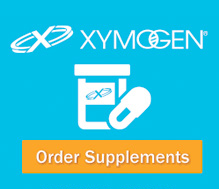Thyroid – A Hormone Powerhouse
Why? Because your thyroid is one of your largest endocrine glands, and plays a part in every function of the body.
It controls your metabolism, body temperature, heart rate, ovulation, protein synthesis, skin health, hair growth and your body’s sensitivity to other hormones.
Thyroid gets its name from the Greek word for “shield-shaped” because it resembles a shield.
Location & Hormone Production
The thyroid gland is located in your neck, below your larynx, and produces several hormones. The main hormones are triiodothyronine (T3) and thyroxine (T4) which is occasionally referred to as tetraiodothyronine.
These hormones control the functions of many other systems within your body.
The thyroid stimulating hormone (THS) is produced within the brain by the pituitary gland. This causes the thyroid gland to produce T4 (thyroxine).
T4 is the main hormone secreted from the thyroid gland. The liver and other body tissues convert most of it to T3 (triiodthyronine) — the more active thyroid hormone.
Heart Health
Thyroid hormones directly affect the heart and peripheral vascular system. They increase myocardial inotropy and heart rate. Also, T3 reduces systemic vascular resistance.
Toxic environments, chronic stress, frequent antibiotic therapy, genetic disorders, infections, nutritional disorders, radiation, hormone imbalances, smoking and tumors can all cause the thyroid to function improperly.
Hyperthyroidism
Hyperthyroidism occurs when your thyroid levels are too high. This is much less common than hypothyroidism (low levels). Excess levels of thyroid hormones, especially T3, can produce grogginess, heart palpitations, high blood pressure, anxiety, weight loss, an intolerance to heat, diarrhea, excess sweating, bone growth and protruding eyes.
Hypothyroidism
Hypothyroidism occurs when your thyroid levels are too low. 17% – 40% of the population suffers from an under active thyroid whether or not they’re aware of it. It seems to be more common in women and elderly people. As you age, your thyroid levels decrease. The conversion of T4 to T3 declines, and your receptor intake sights become less sensitive to conversions. There are three different levels of hypothyroidism: primary, secondary and tertiary.
Hypothyroidism symptoms:
- Hair loss
- Cold hands and feet
- Depression
- Weight gain
- Dry skin
- Headaches
- Fatigue
- Lower-than-average body temperature
- High cholesterol
- Constipation
- Brittle hair
Causes of Hypothyroidism:
- Toxicity
- Candida
- Radiation
- Iodine deficiencies
- Foods That Decrease Thyroid Function:
- Kale
- Cabbage
- Spinach
- Mustard Greens
- Brussel Sprouts
- Peaches
- Pears
- Turnips
- Broccoli
- Cauliflower
- Soy
- Fluoride
- Foods That Increase Thyroid Function:
- Seafood
- Watercress
- Radishes
- Garlic
- Seaweed
- Egg Yolks
- Yogurt
- Cottage Cheese
- Wheat Germ
- Mushrooms
- Poultry of Beef
- Watermelon
Thyroid Testing
Your doctor will screen your levels with a TSH (thyroid stimulating hormone) or a T4 blood test. Your free-T3, free-T4 and TSH levels will all be measured to create a custom balance plan if you need one.
Thyroid Replacement Therapy
You’ve probably noticed various thyroid medications on the market (ex. Synthroid); however, these synthetic medications only replace your T4 hormone, not T3. An aging body becomes less efficient when converting T4 into T3 and occasionally metabolizes it into Reverse T3.
Both T3 and T4 are essential in order for your thyroid to function properly, which is why we use a combination of naturally derived compounds. This mixture of T3 and T4 is much more effective and safer for your body.
Thyroid Replacement Side Effects:
-
-
- Problems sleeping
- Headaches
- Excess sweating
- Increased hunger or thirst
- Anxiety
- Heart palpitations
-
- The T3 hormone crosses the blood-brain barrier, but T3 does not.
- CPR (C-reactive protein) is a marker for inflammation and increases with low thyroid functions.
- Elderly people with high thyrotropin live longer (JAMA 2004:292-2591-2599).
- Women who take thyroid supplements are less likely to be diagnosed with invasive breast [cancer].” – Massimo Cristofanilli, MD. University of Texas M.D. Anderson Cancer Center.
Drugs That May Alter Thyroid Levels:
- Amiodarone
- Androgens
- Iodine
- Slow-release nicotinic acid
- Furosemide
- Heparin
- Calcium Carbonate
- Ferrous sulfate
- Sucralfate
- Hydantoins
- Non-steroidal inflammatory drugs (NSAIDs)
- Salicylates
- Clofibrate
- Estrogen
- Tamoxifen
- Antacids
The Best Time to Take Your Supplements
Thyroid hormones are best absorbed in the morning on an empty stomach.
Your medication should also be taken at least 4 hours apart from any other medication that can influence the absorption of thyroid hormones (ex. calcium, antacids, cholestyramine, sucralfate, etc.).
Bioidentical thyroid compounds have shorter action duration than synthetic compounds. We generally prescribe a micronized extended release of the bioidentical thyroid to combat this limitation. Also, splitting up your dose by taking one in the morning and one in mid afternoon can contribute to a more balanced blood level.
Nutritional Support for Hypothyroidism
If you suffer from hypothyroidism, it’s essential that you’re including a nutritional plan to help combat low levels. Simple organic foods, low-fat options, lean proteins and complex carbohydrates (wheat bread over white) are all good options to introduce into your diet.
Some items to avoid: salty foods, fats, caffeine, alcohol, sugar, fast food, peanuts, pine nuts, fried foods, aspartame, dairy products, red meat (use low-fat, organic or free-range), soy, broccoli and brussel sprouts.
It’s also important to avoid any form of tobacco.
Monitoring Your Thyroid Levels
We will continue to monitor your thyroid levels to ensure they are in optimal balance throughout your treatment. Levels are best measured 4 – 5 hours after your morning dose. After stabilizing your levels, we will reevaluate them every 6 – 12 months.
We look forward to helping you achieve optimal health, wellness, and true vitality, contact us today!

